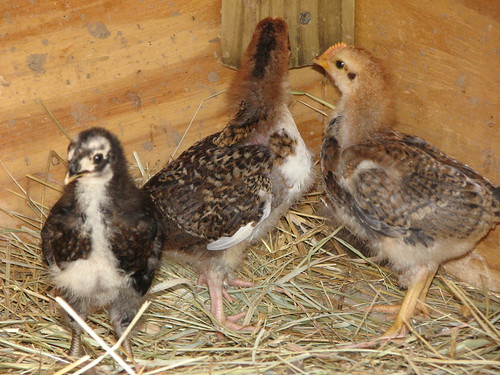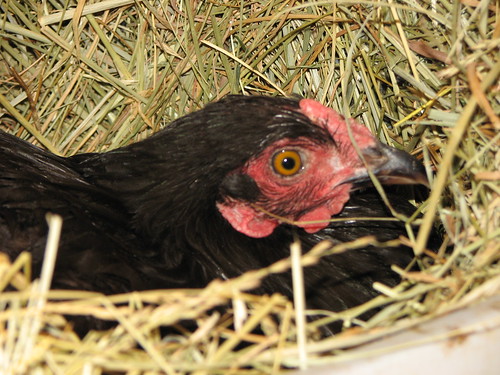Nature has a plan and I've decided that this is the way to raise chickens. It's much easier than picking them up at the post office, checking on them hourly, cleaning up after them and fearing the brooder lamp will go out sometime during a cold snap on an early spring night. There are drawbacks - predators, disease, uncertaintity, but the chickens seem especially happy being, well, chickens. And Broody #1 and Broody #2 are showing some good mothering genes. Today as I was trying to pick up the surprise chicks I was attacked by Broody #1 (that's a drawback, for sure). She's left a rather hefty mark on my hand for trying to make contact with her babies. I have no idea if she is the biological mother of any of the four chicks, but they belong to her.
Here are three of the four chicks. The other was being naughty and hanging out in the other pen. Another few days and they won't be able to fit through the 2 inch wire. The shy one in the middle is my favorite. I think it is another Speckled Sussex. My money is on the yellow-legged one on the right being a boy. The one on the left is a funny looking kid. There are partridge patterns, laced patterns and speckling. Number Two (who I inherited from Jaime) is most likely the father of these three. Although Lefty could be a Speckled Sussex hen and Rufus, the Golden Laced Wyandotte. The AWOL Chick is black, like its mother.
There are only 3 more days until hatch. Broody #2 has been at it through all this heat. We are keeping fingers crossed for more chicks and maybe another Speckled Sussex or two. I know there is one Ameracuana egg (I've only one hen left), so maybe a green egg layer will hatch.
While I do like this method, I am still planning on a big order this coming spring. I skipped it this year. With an eye on the egg market, I'm thinking more Ameracaunas, a few more Black Australorps and some Barnevelders for variety in egg color. The Australorps just lay like crazy and both of the broody hens are offspring of my two Australorp hens and Rufus. Come to think of it, maybe I'll add a few more Wyandottes to the flock. Stop me now, please.





Isn't it so much more fun to enjoy the anticipation of the hatch rather than the call from the post office? And I love being able to watch them grow up without having to worry about all the things you mentioned.
ReplyDeleteIt's almost like being the aunt instead of the mother. I get the good times, and momma hen gets the PITA times. Plus she has to worry about keeping them warm.
Yay for chicks!
*nods vigorously*
ReplyDeleteyay for chicks indeed!
I'd bet on that being a roo too! Every year when hens hatch out some random chicks I think - now, that's the easy way to do it. A few months later when I have a 3:1 ratio of males to females I think, hmmm, we won't be stopping the hatchery orders anytime soon, *grin*
ReplyDeleteWe have a 20 acre goat farm, but my family will tell you that my first love are my chickens. I am interested in a breed of chickens that will actually hatch out their own eggs. Can you recommend a breed that will go broody and actually sit on the nest long enough to hatch out the eggs? I've got Buff orpingtons, which are great egg layers, and though I've had a couple start out a nest, they never seem to stick with the job. Thanks, Margot:
ReplyDeletemargotmb10@earthlink.net
I would recommend, Japanese bantams, Silkies and Orpington bantams for hatching there own eggs, all do tended to go broody really easily. The last has hatched stacks of her own and has happily hatched our other chickens eggs. She’s currently walking around with 6 chicks three are Silkie crosses (Japanese bantam rooster) and three are her own from the same rooster. Is it normal for chickens to sit the same nest though? We’ve had a Silkie start sitting its clutch then the Orpington joined her to hatch so we currently have 6 chicks between two hens…….our Japanese bantams have sat 5 chickens to one nest of 6 eggs (we didn’t realise they had gone broody until they started sitting so had been collecting the eggs) so Pig (the one that hatched) has 5 mothers and is getting slightly over fed….hence the name. check omlet.co.uk for more info as its helped me no end!!!
ReplyDeleteWWW.omlet.co.uk
ReplyDeleteWas the one on the right a roo?
ReplyDelete